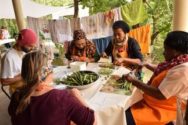
What does President Trump mean for off-grid living?
Trump’s politics resonate with those who want to live our American dream. He is selling a promise to ‘make America great again’. Conversely, many feel like they might pack up and move to another country.
One voter, Tim Kennedy, claims America will be a dying country if people don’t change their ways. He says off-grid living may be the secret to freedom and a sustainable way of life, that it is the way that we as humans are supposed to live.
This is just one man’s view, a staunchly patriotic view at that. It may not be for everyone, as it takes a lot to adapt to, and not everyone has an opportunity to do so. However, there is truth in that we are paying a higher cost in our own personal happiness and wellbeing by subscribing to the confines and regimented expectations of society.
Many of those who have been living off-grid for some time, now preparing for life under Trump out of fear and trepidation, are surprised others see it as the ultimate act of patriotism and are preparing for it out of sheer anticipation.
Some simply believe that our society is, and has been in a downward spiral since the 2008 global financial crisis, and prefer to live off-grid to escape global threats to modern society such as terrorism, cyber security, and further economic turmoil.
In 2014, an estimated 1 million people live off-grid in America, a figure that has steadily risen in the past few decades. Across the UK, there are already thousands of people who have embraced the off-grid movement. There is a certain appeal to this way of life, to be self sufficient and liberated from the chains of a capitalist consumer society, by embracing this low cost, eco-friendly way of life.
Generally speaking, much of Trump’s support comes from disenfranchised elements who feel nobody was speaking for them.
Does Trump’s America mean that people will embrace this way of living? Certain states ban homes smaller than a few hundred square feet, and some cities welcome these so-called ‘tiny homes’. Trump has spoken about the costliness of renewable solar and wind power; however there is evidence to show that renewable energy in the US is cheaper than it has ever been.
For off-gridders preparing for life under Trump, some don’t see his rule as so much of a threat. Rather, they believe that he may not be able to accomplish what he says that he is set out to do, and are simply fed up of politicians and politics in America. It may be this very reason why more people turn to off-grid living.…
